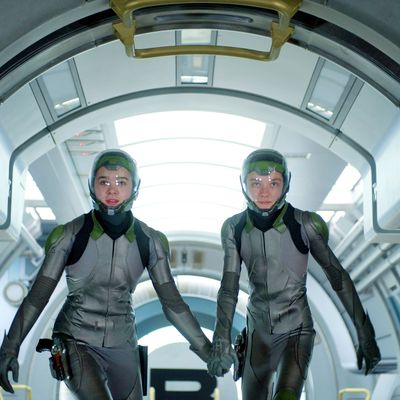
This is shorthand but nonetheless handy: Orson Scott Card’s 1985 novel Ender’s Game and its fine, sober screen adaptation directed by Gavin Hood, can be thought of as a counter–Star Wars or perhaps a non-satirical Starship Troopers (assuming you think S.T.’s jingoism is satire). Its view of war is chilly, unromantic. The commanders are at best cruel and invasive, at worst demented. The hero’s eventual mastery of the art and science of wiping out the enemy is a personal triumph and — potentially — a universal tragedy.
Fifty years after an alien invasion wiped out much of Earth’s population, young Ender Wiggin (played onscreen by Asa Butterfield, of Hugo) advances through the ranks of an elite military academy—where he’s monitored every second by a gritty, bug-eyed colonel (Harrison Ford) and a stoic major (Viola Davis). They’re looking for a hero, the One who will take the fight to the ostensibly warlike aliens before they come back and finish off the planet. Ender clinches the case in the colonel’s mind when he serves up extra kicks to a bully—hard enough to put the kid in the hospital. (“See? He’s got a talent for strategy!”) So the kid is fast-tracked. He mouths off to authority when he thinks the rules make no sense; earns the respect of his often bigger, older fellow students; and quickly becomes a virtuoso at orchestrating simulated computer attacks on the alien planet. The only wrinkle is that he has an innate gentleness—which the colonel works to purge. He’s also having dreams in which his beatific older sister (Abigail Breslin) beckons him forward and tries to impart some cryptic information.
Apart from its artfully inhuman production design, this is not an imaginative piece of filmmaking. The editing (by frequent Christopher Nolan collaborator Lee Smith) is monotonous, the dialogue (much of it straight from the book) stilted. It feels a bit underpopulated, and Ender’s intricate cyber-battles aren’t as involving as they are on the page. But this is one of those movies in which you can’t always tell what’s inept and what’s purposefully flat. I’m inclined to cut Hood slack. In spite of the nonstop thunderous orchestral score, Ender’s Game forgoes the usual rah-rah-kill-the-Alien-Other tone that powers so many of our mainstream action pictures. Whether younger audiences primed to cheer will submit to this is an open question. I hope so. The end delivers a kick that should knock the wind out of anyone.
Butterfield is subtle, not overpowering. He has come out the other side of puberty with an unusual body for a juvenile hero: long and stringy, with narrow shoulders. But he has retained his watchful intelligence. Ender has been traumatized at home by an older and angry brother, and Butterfield moves like someone who has been damaged —who has indeed acquired, as a consequence, a talent for strategy. The scenes in which Ford and Davis stand around watching Ender on a big monitor and debating his fitness are, as I said, straight from the book, and there’s a touch of Edward Wood Jr. in their stiffness. Ender’s Game’s only lyrical presence is Breslin’s. The actress has a gentle soul. In the end, she’s the movie’s mascot, and its mournful spirit.


